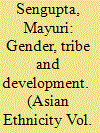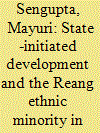| Srl | Item |
| 1 |
ID:
157952


|
|
|
|
|
| Summary/Abstract |
The article critically examines the gendered impacts of state-led development among the Reang tribal community in Tripura (Northeast India) and outlines causes of gender-based inequalities that affect Reang women’s ability to engage in livelihood, achieve financial independence and participate in political affairs of the state. The article outlines two interlinked arguments. First, gender-based inequalities are not adequately addressed by the postcolonial Indian state which tends to homogenise members of tribal communities through development policies by privileging ethnicity over gender. Second, gender-based inequalities are also not adequately addressed within the Reang community highlighting complex intra-tribal dynamics wherein differential notion of inequalities among the Reangs and position of certain influential actors within the community determines which issues are addressed and which are marginalised.
|
|
|
|
|
|
|
|
|
|
|
|
|
|
|
|
| 2 |
ID:
131612


|
|
|
|
|
| Publication |
2014.
|
| Summary/Abstract |
This paper explores the wider implications of state-led development on the Reang ethnic minority in the North East Indian state of Tripura, and in doing so presents a critical view on such development endeavours. Basing itself on the study of the relationship between the state and the ethnic minorities, this research argues the following: - first, most state-led development programmes are formulated on a preconceived notion of 'backwardness' in the ethnic minorities. Second, state-led development projects create internal fissures and ruptures within ethnic minorities on issues of what constitutes development. Third, often, state-led development programmes create an image of oneself as inherently 'backward', whereby the conditioning of the mind plays an important role in extending the desire of the members of an ethnic minority to achieve this 'imagined modernity'.
|
|
|
|
|
|
|
|
|
|
|
|
|
|
|
|